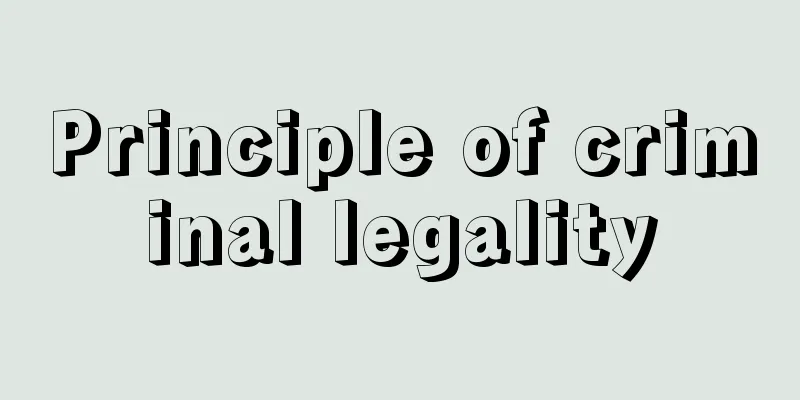Principle of criminal legality

|
A basic principle of modern criminal law is that in order to punish something as a crime, it is necessary to clearly define in advance by law what constitutes a crime and how it should be punished. In contrast, the idea of leaving criminal punishment to the sole discretion of law enforcers is called criminal arbitrariness. Feuerbach, known as the father of modern criminal law, aptly expressed this principle with the slogan "Nullum crimen, nulla poena sine lege" (without law, there are no crimes and no punishments). Historically, the principle of criminal legality is said to have originated in the Magna Carta (Article 39) in England in 1215, but it was not until the Petition of Right (1628) and the Bill of Rights (1689) that it was established as a principle of modern civil law. This principle was introduced in the New World of America, where it was included in the Philadelphia Declaration (1774) and the Virginia Declaration of Rights (1776), and was later included in the United States Constitution, stating that "No person shall be deprived of life, liberty, or property, except by due process of law" (5th Amendment). In continental Europe, the Declaration of the Rights of Man (1789) during the French Revolution also stated that "No person shall be punished except by law, which had been made and published before the crime was committed, and which had been duly applied" (Article 8), and it was also clearly stated in Article 4 of the Napoleonic Penal Code of 1810. In Japan, the old Criminal Code (1880), which was modeled on the Napoleonic Criminal Code of France, clearly stated that the principle of criminal legality was adopted, stating that "anyone who commits an act contrary to the law shall not be punished, no matter what his or her actions may be" (Article 2), and the Meiji Constitution also contained a provision (Article 23) that adopted this principle. In contrast, the current Criminal Code (1907) and the postwar Japanese Constitution do not contain any provisions that explicitly state that this principle is adopted, but rather, it can be said that it is taken for granted. However, the current Constitution, modeled on the Fifth Amendment (Due Process Clause) of the United States Constitution, stipulates in Article 31 that "No person shall be deprived of life or liberty, nor shall any other criminal punishment be imposed, except according to procedure established by law" (Article 39 contains a provision prohibiting ex post facto laws, which will be described later). Regarding the principle of criminal legality, there are two main ways of looking at it in terms of its ideological basis: the principle of criminal legality as a democratic requirement and the principle of criminal legality as a liberal requirement. First, based on modern Enlightenment thought, particularly the social contract theory and separation of powers theory of the time, Italian Beccaria based the state's right to punish in the social contract, and strongly denied the judges' authority to legislate or interpret laws, believing that only parliament has the authority to enact criminal laws. Beccaria advocated the principle of criminal legality from the standpoint that crimes and punishments must be based on the social contract (also called the "general will of society" or the "will of the people"). In this sense, Beccaria based the principle of criminal legality in "democracy," as it is commonly expressed today. In response to this, Feuerbach, on the premise of a rational (utilitarian) human image that seeks pleasure and avoids pain, argued that if laws were established in advance that the pain caused by the punishment for a crime is greater than the pleasure gained from the crime, people would stop committing crimes. This way of thinking is called the psychological compulsion theory (or the equilibrium theory), and the slogan for the principle of criminal legality mentioned above was based on this. In this way, Feuerbach tried to guarantee predictability for citizens through criminal legality, and the state's power of punishment has the function of guaranteeing citizens' freedom of action. In this sense, Feuerbach's principle of criminal legality can be said to be based on liberal requirements. When considering the two ideal types of criminal legality as mentioned above, these two types are not necessarily contradictory, and rather, a way of thinking that unifies the two is necessary. The following principles are derived from this principle of criminal legality. The traditional principles include (1) the principle of exclusion of customary criminal law, (2) the principle of prohibition of analogical application, (3) the principle of prohibition of ex post facto laws or retroactive application of criminal law, and (4) the principle of prohibition of absolute indefinite sentences. More recently, the idea of requiring clarity in criminal laws based on the American theory of "clarity" has been widely supported, and a view has been asserted that the content of criminal laws itself requires substantial rationality in punishment, including proportionality between crime and punishment, based on the American theory of "substantive due process." In Japan, in terms of positive law, if a criminal law lacks clarity or does not have a reasonable basis for punishment, it will violate the due process clause stipulated in Article 31 of the Constitution and be deemed unconstitutional. [Tetsuro Nawa] Source: Shogakukan Encyclopedia Nipponica About Encyclopedia Nipponica Information | Legend |
|
犯罪として処罰するためには、何を犯罪とし、これをいかに処罰するかをあらかじめ法律により明確に定めておかなければならない、という近代刑法上の基本原則。これに対し、罪刑を法執行者の専断にゆだねる考え方を罪刑専断主義という。近代刑法学の父とよばれるフォイエルバハは、この原則を「法律がなければ犯罪はなく、刑罰もない」Nullum crimen, nulla poena sine legeという標語により適確に表現している。この罪刑法定主義の原則は、沿革的には、1215年のイギリスにおけるマグナ・カルタ(第39条)に由来するものとされるが、これが近代市民法の原理として確立したのは、その後の権利請願(1628)や権利章典(1689)であった。この原則は、新大陸アメリカに渡り、フィラデルフィア宣言(1774)やバージニアの権利宣言(1776)に盛り込まれ、アメリカ合衆国憲法でも「何人(なんぴと)も、法律の適正な手続due process of lowによらなければ、生命、自由、または財産を奪われない」(修正第5条)と規定されるに至った。また、ヨーロッパ大陸では、フランス革命期の人権宣言(1789)でも、「何人も、犯罪の前に制定され、公布され、かつ、適法に適用された法律によらなければ、処罰されない」(第8条)と表明され、1810年のナポレオン刑法典第4条にも明言されている。 わが国では、フランスのナポレオン刑法典を範とする旧刑法(1880)が「法律ニ正条ナキ者ハ何等(なんら)ノ所為ト雖(いえど)モ之(これ)ヲ罰スルコトヲ得ス」(第2条)と規定して、罪刑法定主義を採用することを明言しており、明治憲法にもこの原則を採用する旨の規定(第23条)が存在した。これに対し、現行刑法(1907)や戦後の日本国憲法には、この原則を採用する旨を明言した規定は存在しないが、むしろ、当然の前提とされているといえよう。ただ、現行憲法は、アメリカ合衆国憲法の修正第5条(適正手続条項)を範として、その第31条が「何人も、法律の定める手続によらなければ、その生命若(も)しくは自由を奪はれ、又はその他の刑罰を科せられない」と規定している(なお、第39条には後述する事後法禁止の規定がある)。 ところで、罪刑法定主義につき、その思想的根拠に関連して、大きく次の二つのとらえ方がある。民主主義的要請としての罪刑法定主義と、自由主義的要請としての罪刑法定主義がそれである。まず、近代啓蒙(けいもう)思想、とくに当時の社会契約説や三権分立論を思想的根拠として、イタリアのベッカリーアは、国家刑罰権の根拠を社会契約に求め、議会のみが刑罰法規を立法する権限をもち、裁判官の立法や解釈をする権限を強く否定している。ベッカリーアにおいては、罪刑が社会契約(「社会の総意」「国民の意思」ともいう)に基づく必要があるという立場から、罪刑法定主義を主張したのである。この意味で、ベッカリーアは、罪刑法定主義の根拠を、今日的表現に従えば、「民主主義」に求めたのである。これに対して、フォイエルバハは、人間は快を求め不快を避けるという合理的(功利的)人間像を前提として、あらかじめ法律において、犯罪により得られる快よりも、犯罪に対する刑罰による不快のほうが大であることを定めておけば、人々は犯罪を犯さなくなると主張した。このような考え方は心理強制説(または平衡説)とよばれ、前述した罪刑法定主義に関する標語もここに根拠を置くものであった。このように、フォイエルバハは、罪刑法定により市民に対し予測可能性を担保しようとするものであり、国家刑罰権に対しては、市民の行動の自由を保障する機能を有する。この意味において、フォイエルバハの罪刑法定主義は、自由主義的要請に基づくものといえるのである。以上のような罪刑法定主義に関する二つの理念型を想定する場合、これらの二つの型はかならずしも矛盾するものではなく、むしろ両者を統一する考え方が必要であろう。 このような罪刑法定主義から次のような派生的原則が導き出される。伝統的な派生原則として、(1)慣習刑法排除の原則、(2)類推適用禁止の原則、(3)事後法禁止または刑法不遡及(ふそきゅう)の原則、(4)絶対的不定期刑禁止の原則、があげられてきた。さらに最近では、アメリカでの「明確性の理論」に基づき、刑罰法規の明確性を要求する考え方が広く支持され、同じくアメリカの「実体的デュー・プロセスsubstantive due process」の理論を前提に、刑罰法規の内容そのものについても、罪刑の均衡をはじめ処罰の実質的な合理性を要求する見解が主張されている。わが国では、実定法的には、刑罰法規が明確性を欠いたり、合理的処罰根拠を有しない場合には、当該刑罰法規が憲法第31条の規定する適正手続条項違反となり、違憲と判断されることになる。 [名和鐵郎] 出典 小学館 日本大百科全書(ニッポニカ)日本大百科全書(ニッポニカ)について 情報 | 凡例 |
>>: Asset accumulation system - Zaikeiseido
Recommend
Evacuation - Unforgivable
〘Adj.〙 sarigatashi 〘Adj.〙① Difficult to avoid. Dif...
Inferior colliculus
… When the human midbrain is viewed from the outs...
thermal neutron
…This is called plu-thermal utilization. “Plu” is...
Tansy (English spelling)
A genus of the Asteraceae family consisting of abo...
"Yenching Academic Journal" - Academic journal
…The school formed the Harvard-Yenching Society i...
Ambrose Bierce
American journalist and novelist. Known as an unp...
One and a half moves
… [Definition] In Buddhism, sculptures and painte...
Coriolis - Gaspard Gustave de Coriolis
French mechanician. Famous for the Coriolis force...
Shunyodo
A publishing company founded in 1878 by Wada Atsut...
Kashikazawa Riverbank
...The basin of the Oyanagawa River, which flows ...
Gorakhnath (English spelling)
The founder of Hatha Yoga. He is also called Gorak...
Natchez (English spelling)
A city on the Mississippi River in the southwester...
Appoggiatura
...The names vary from country to country and fro...
Sovremennik
…In Leningrad, Tovstonogov breathed fresh air int...
Laser spectroscopy - Laser spectroscopy
Spectroscopy using laser light. Spectroscopy is a ...









